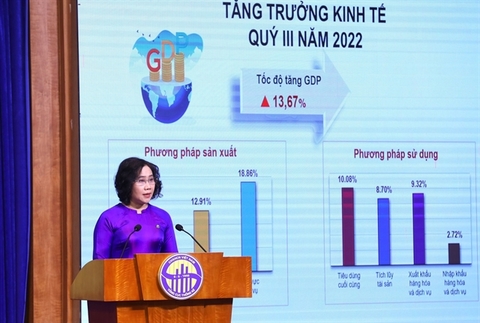Viet Nam's gross domestic product (GDP) expanded 13.67 per cent in the third quarter of this year, helped by a rebound in manufacturing and a lower base than a year ago, the General Statistics Office (GSO) said Thursday.
Business activities in the third quarter saw strong growth, especially compared with the same period last year when several parts of the country were under strict lockdown due to the pandemic, said GSO Director General Nguyen Thi Huong.
In Q3 this year, the agriculture-forestry-fishery sector increased by 3.24 per cent, the industry and construction sector was up 12.91 per cent, while the service sector rose by 18.86 per cent, Huong said.
Regarding GDP use, final consumption expenditure increased by 10.08 per cent over the same period last year; accumulated assets rose by 8.7 per cent; exports of goods and services surged 9.32 per cent, and imports of goods and services were up 2.72 per cent.
With upbeat signs reported in almost all aspects between January and September, the GDP was estimated to rise 8.83 per cent for the period, the highest nine-month growth recorded in 2011-2022, said GSO Director General Nguyen Thi Huong.
In nine months, the GSO also pointed out that the agro-forestry-fishery sector grew by 2.99 per cent. The industry and construction, meanwhile, increased by 9.44 per cent, and service rose by 10.57 per cent.

GSO Director General Nguyen Thi Huong addresses a conference held by the General Statistics Office (GSO) Thursday. — VNA/VNS Photo Hoang Hieu
As for GDP use, final consumption expenditure climbed 7.26 per cent over the same period last year; accumulated assets rose by 5.59 per cent; exports of goods and services up 8.94 per cent and imports of goods and services up 4.74 per cent.
Huong said in the period, ministries, sectors, and localities have drastically implemented the Government's resolutions serving the nation's programme for recovery and socio-economic growth.
As a result, the macro-economy was stabilised, inflation was put under control, major balances ensured, monetary and fiscal policies conducted flexibly and effectively, the business investment environment improved, and social security was guaranteed, she said.
CPI up 3.32 per cent in Q3
The Consumer Price Index (CPI) in the third quarter of 2022 posted a year-on-year rise of 3.32 per cent.
The office said CPI in September increased by 0.4 per cent month-on-month, up 4.01 per cent against December 2021 and up 3.94 per cent compared to the same period last year.
GSO General Director Nguyen Thi Huong attributed the increase in CPI in September to the price of essential consumer goods and services increasing in line with the price of input materials and transportation costs, the continuous hikes in domestic petrol prices in tandem with world fuel prices, as well as rising tuition fees.
On average, in the first nine months, CPI increased by 2.73 per cent over the same period last year; core inflation rose by 1.88 per cent.
The COVID-19 pandemic has been controlled, meaning demand for eating out has increased. The average prices of restaurant services in nine months increased by 4.38 per cent over the same period last year, causing the overall CPI to increase by 0.38 percentage points. Although domestic gas prices fluctuated according to world gas prices, gas prices in nine months rose by 18.75 per cent over the same period last year.
The price of food items in the first nine months of 2022 increased by 0.5 per cent over the same period last year, causing CPI to increase by 0.11 percentage points. In addition, the increase in domestic rice prices in line with the export prices of rice made the prices of rice in the first nine months increase by 1.14 per cent year-on-year, increasing the overall CPI by 0.03 percentage points.
However, it wasn't all bad, and CPI across many sectors decreased in the third quarter of 2022, including education service fees which dropped by 1.88 per cent. A number of provinces and centrally-run cities exempt and reduced tuition fees from the first semester of the 2021-2022 school year due to the impact of the COVID-19 pandemic, causing CPI to decrease by 0.1 percentage points.
The domestic gold price fluctuated in the same direction as the world gold prices. As of September 25, 2022, the average world gold price stood at $1,702.79 per ounce, down 4.74 per cent compared to August 2022, when the US tightened monetary policy.
Domestically, gold price in September 2022 decreased by 1.71 per cent compared to the previous month, up by 1.34 per cent compared to December 2021, up by 4.06 per cent over the same period last year. — VNS